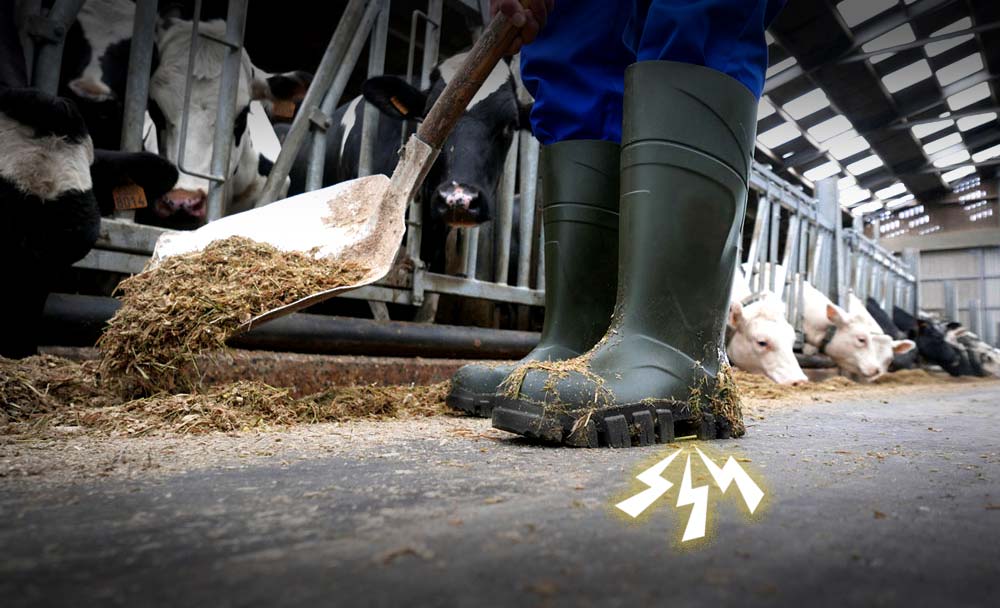How to wear wellies and stop plantar fasciitis.
If you wear wellies all day, you’ll understand how important good foot health is. The condition plantar fasciitis is common among dairy farmers and farm workers due to the very nature of the job. Plantar Fasciitis was historically referred to as ‘Policeman’s Heel’ and is also very common among nurses and other health professionals – understandably, because we as humans weren’t designed to stand on cold hard surfaces for 10-12 hours a day!
But what do Farmers do? Wellies are a must and wearing incorrect or unsupportive wellies can lead to trouble, pain and discomfort at work.
How do you avoid, or reduce heel pain and plantar fasciitis while wearing wellies?

First of all, what is plantar fasciitis, and why is it common in those who live in wellies?
Plantar Fasciitis (pronounced plan-tar face-ee-eye-tis) is a swelling of the tendons around the heel, causing sharp pain when standing, walking and moving. According to the NHS you’re at greater risk of developing Plantar Fasciitis if:
- You’re aged 40-60
- You spend time standing or walking on hard surfaces
- You stand or work with a tight calf or heel
- Your footwear has poor cushioning or support
- Are overweight
Many of these causes will sound very familiar to farmers and dairy workers, they almost describe the working life on a farm! But if you suffer from Plantar Fasciitis or want to reduce your chances of developing the condition there are helpful steps you can take.
Top Tips to reduce or avoid Plantar Fasciitis when wearing wellies.
- Use a good arch supporting insole
- Use cushioned heel pads
- Select correctly fitting wellies with adequate support
- Use the same support in all footwear whenever possible
- Commit to wearing supporting insoles long term to prevent reoccurring issues
See our selection of supporting arch insoles
See our collection of supportive wellies
- Rest and raise your feet on a stool whenever possible
- Stretch regularly on a raised step
- Stretch each morning for 2 minutes following these steps:
A. Before getting out of bed
B. Lie on your back
C. Gently raise your toes to point towards your knees
D. Then slowly point your toes down
E. Slowly rotate your feet 360° by the heel
F. Repeat
- Start a low stress exercise routine, for example:
A. Swimming
B. Cycling
C. Gym or weight exercises
D. Swap outdoor running for treadmill running (due to a softer/cushioned impact) - Try and lose weight, to reduce general load on your joints, including ankle and feet
- Use an ice pack (or the old frozen peas in a tea towel trick) for up to 20 minutes every 2-3 hours
- DO NOT use heat packs, as this may exacerbate swelling and result in the reverse effect you desire
- Speak to a pharmacist about painkillers or insoles if you are unsure.
If pain persists, always consult your GP.
Which wellies are best for Plantar Fasciitis?
Our top picks for wellies that provide cushioning and support for those that suffer with plantar fasciitis are:
- Skellerup Quatro – the ergonomic and contoured footbed in the Skellerup Quatro range of boots provides extra arch support and heel pad cushioning helps to prevent heel inflammation.
- Seals Thermax – A neoprene insole in the Seals thermax provides a cushioning layer all throughout the boot that gives the sensation of wearing trainers rather than wellies.
- Aigle Parcours 2 – All boots in the Aigle Parcours 2 range benefit from Aigle’s anti-fatigue sole, a cushioned construction with shock absorbing heel insert specifically designed to remove shock and stress from the heel when walking long distances over mixed terrain. Our top pick for anyone who has concerns over foot comfort whatsoever, they really need to be tried to feel the difference!
Do not put up with it – sort it.
Plantar Fasciitis is very common and can be VERY stubborn to fix. Farmers and dairy farmers are particularly susceptible and living a hard-working busy life you may feel it’s best just to see how it goes - but without changes to your routine or daily habits, Plantar Fasciitis is highly unlikely to just go away on its own. We know time is precious, but Plantar Fasciitis does not have to stop you working.
The good news:
The good news is that you don’t have to suffer - with consistent effort and determination, small habit changes, better understanding of foot support and the right advice from your GP - you can overcome Plantar Fasciitis.
Further advice:
For more advice, options and helpful links the NHS plantar fasciitis guide has all the answers you’re looking for.
For advice on the best supporting wellies for working feet, contact us today.


